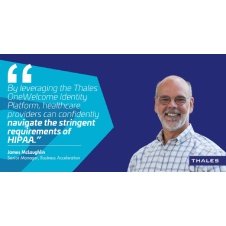Thales OneWelcome Identity Platform and HIPAA Compliance in 2025
As the healthcare landscape continues to evolve, so too do the regulations that govern it. The Health Insurance Portability and Accountability Act (HIPAA) has undergone significant changes in 2025, introducing enhanced requirements aimed at addressing the growing cyber threats and ensuring comprehensive data protection. In this context, the Thales OneWelcome Identity Platform emerges as a vital solution, fully compliant with HIPAA and offering robust Customer Identity and Access Management (CIAM) solutions tailored to meet these updated regulations.
Key HIPAA 2025 Updates
The 2025 updates to HIPAA reflect a proactive approach to safeguarding electronic Protected Health Information (ePHI). Some of the most notable changes include:
-
Annual IT Asset Inventories and Network Mapping: Organizations are now required to maintain detailed inventories of their IT assets and map their networks to identify potential vulnerabilities.
-
Mandatory Encryption of All ePHI: Encryption is no longer optional; all ePHI must be encrypted both at rest and in transit to protect against unauthorized access.
-
Implementation of Multi-Factor Authentication (MFA): All systems that handle PHI must implement MFA, adding an extra layer of security to user authentication processes.
-
Stricter Identity Verification and Authentication: Healthcare organizations must adhere to stricter requirements for verifying and authenticating identities across all patient touchpoints.
-
Annual Security Audits and Vulnerability Scans: Regular security audits, penetration tests, and biannual vulnerability scans are now mandatory to ensure ongoing compliance and security.
-
Contingency Plans for Data Restoration: Organizations must have contingency plans in place to restore data within 72 hours during incidents, ensuring minimal disruption to healthcare services.
-
Advanced Access Controls: Enhanced access controls and user management are required for consumer-facing applications to protect sensitive information.
- Business Associate Cybersecurity Measures: There are stringent requirements for verifying the cybersecurity measures of business associates that handle PHI.
How Thales OneWelcome Identity Platform Supports HIPAA Compliance
The Thales OneWelcome Identity Platform is designed to help healthcare organizations navigate these stringent requirements effectively. Here’s how it aligns with the updated HIPAA regulations:
1. Secure Access Management
The platform enforces granular access controls based on user roles and context, ensuring that only authorized personnel can access PHI. Centralized policy management simplifies compliance with the Privacy Rule restrictions on PHI sharing, making it easier for organizations to adhere to regulations.
2. Robust Authentication
Thales OneWelcome implements advanced authentication methods, including MFA, to ensure that only verified users can access sensitive information. This robust authentication framework is crucial for meeting the new HIPAA requirements.
3. Data Protection
To comply with the mandatory encryption requirements, the platform encrypts ePHI both at rest and in transit. Additionally, it protects encryption keys through advanced key management solutions, ensuring that sensitive data remains secure.
4. Comprehensive Monitoring and Risk Assessments
The platform tracks user activity across systems handling PHI, enabling real-time detection of unauthorized access attempts. Regular risk assessments are facilitated by identifying vulnerabilities in IT assets and networks, helping organizations stay ahead of potential threats.
5. Contingency Planning
Thales OneWelcome offers scalability to handle sudden increases in authentication requests during emergencies or crisis situations, ensuring uninterrupted access to critical healthcare systems. It also integrates with disaster recovery systems to ensure the restoration of critical data within the required 72-hour window.
Benefits for Healthcare Organizations
By adopting the Thales OneWelcome Identity Platform, healthcare organizations can enjoy several key benefits:
-
Enhanced Security: Protect sensitive patient data through encryption, MFA, and activity monitoring, significantly reducing the risk of data breaches.
-
Simplified Compliance: Native Consent & Preference management streamlines adherence to global data privacy regulations, making compliance a natural part of the customer journey.
-
Improved Efficiency: The platform automates compliance tasks, reducing the administrative burdens on IT teams and allowing them to focus on more strategic initiatives.
- Future-Proof Solution: With its modular architecture, the Thales OneWelcome Identity Platform ensures scalability for evolving regulatory requirements, allowing organizations to adapt to future changes seamlessly.
Healthcare Challenges Solved by Thales OneWelcome Identity Platform
The Thales OneWelcome Identity Platform addresses several challenges faced by healthcare organizations:
-
Balancing Security and Usability: The platform implements adaptive authentication and supports passwordless methods, reducing friction for users while maintaining robust security measures.
-
Integration Complexity: Thales provides detailed guidance and support for seamless integration with existing healthcare applications, minimizing disruption during implementation.
- Resource Optimization: As a cloud-based solution, Thales OneWelcome reduces upfront costs and infrastructure maintenance, allowing healthcare organizations to allocate resources more effectively.
Conclusion
In an increasingly digital healthcare ecosystem, leveraging the Thales OneWelcome Identity Platform enables healthcare providers to confidently navigate the stringent requirements of HIPAA while safeguarding patient trust. With its comprehensive features aligned with the 2025 HIPAA updates, the platform ensures that healthcare organizations stay ahead of compliance requirements and cyber threats, ultimately enhancing the security and integrity of patient data.


